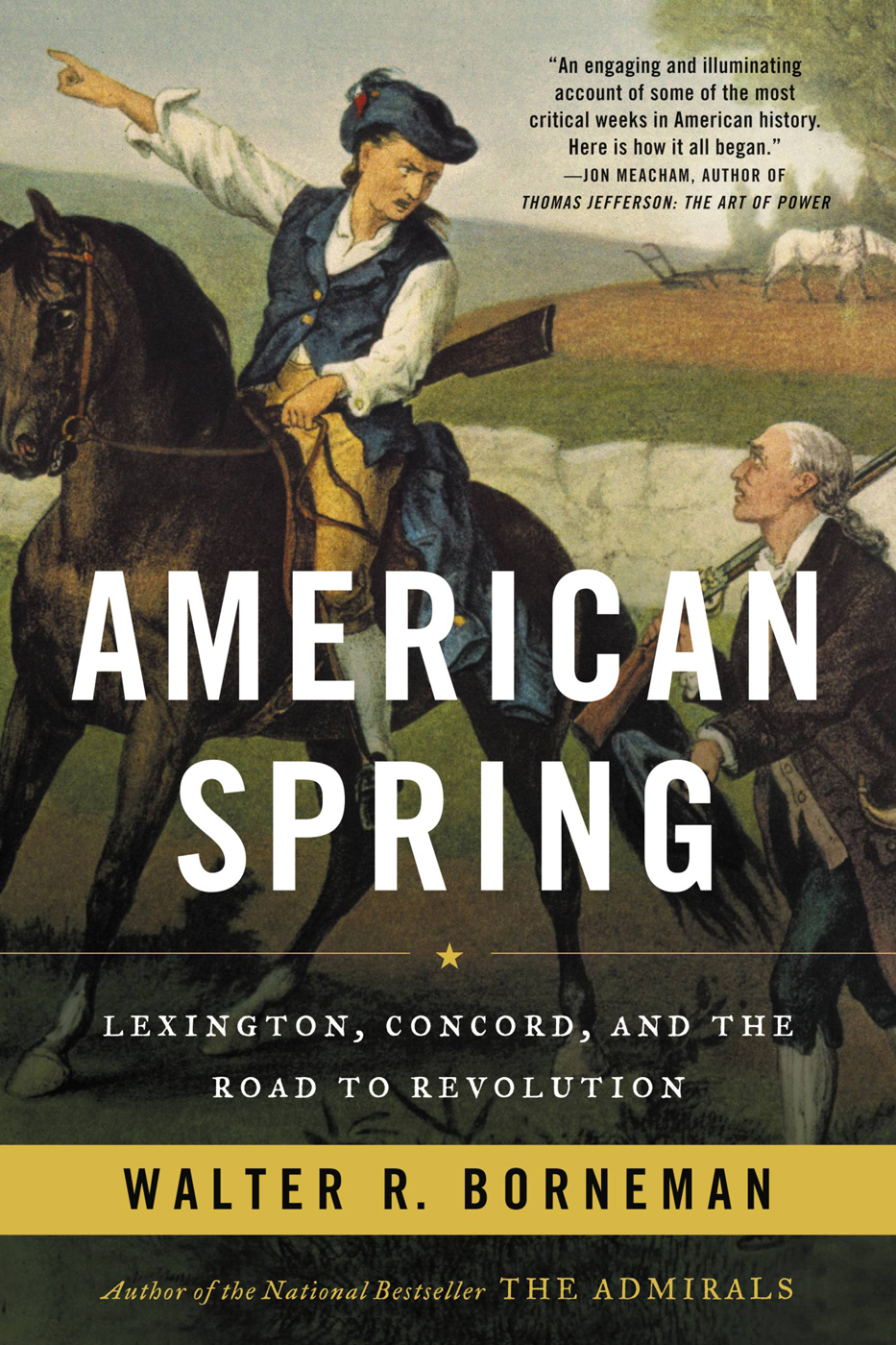
American Spring
Lexington, Concord, and the Road to Revolution
کتاب های مرتبط
- اطلاعات
- نقد و بررسی
- دیدگاه کاربران
نقد و بررسی

March 24, 2014
Borneman (The Admirals) takes on the oft-examined topic of the Revolutionary War and zooms in on the events and months leading up to the rebellion—the “American” spring, as it were, of 1775, up until Monday, July 3, 1775, when George Washington officially takes command of the Continental Army. Borneman takes on this important moment in history in a broad and all-encompassing manner, providing details on both the major players and events of the time as well as the ways revolution was affecting the quotidian routine of ordinary colonial settlers. This approach gives the reader not just a comprehensive understanding of the rebels’ motives, obstacles, and overall tensions, but also makes the setting of the colonies during the spring of 1775 vivid and real to a 21st-century audience. The book aims to expand upon and illuminate current history rather than challenge traditional understandings of the era, though Borneman thoroughly acknowledges the large number of loyalist settlers, and shortcomings of the rebel movement, such as their occasional tendency toward violent protests (two aspects of history that Americans sometimes overlook). Borneman doesn’t add new angles, but his extensive coverage of the events and balanced writing style make it an enjoyable and accessible read. B&w illus.

Starred review from April 1, 2014
An extremely detailed, opinionated account of events in 1775 Massachusetts ending (despite the title) two months after the famous skirmishes in the June Battle of Bunker Hill. By that spring, American colonists had spent the previous 10 years fending off Britain's attempts to recover the ruinous costs of the French and Indian War, writes popular historian Borneman (The Admirals: Nimitz, Halsey, Leahy, and King--The Five-Star Admirals Who Won the War at Sea, 2012, etc.). The author accepts their time-honored protest against taxation without representation but admits that Americans paid less in taxes than Britons and had benefited greatly from the recent victory. Ironically, 150 years of Britain's benign neglect had resulted in 13 largely self-governing colonies that were disinclined to change. The most appealing figure is, oddly, British Gen. Thomas Gage (1720-1787), a longtime resident in America, who understood better than London officials how bad matters were. Pugnacious colonial militias were drilling and accumulating arms, and Boston mobs were assaulting loyalists and trashing their homes. Gage's restraint exasperated superiors in London, who, in April 1775, sent a blunt order to take action. The result was an expedition that marched all night to seize arms at Concord but stumbled on a band of armed militia in Lexington. Taking advantage of massive documentation, Borneman delivers a gripping, almost moment-by-moment account of the nasty exchanges and bloody retreat of British troops followed by hundreds and then thousands of militia who camped around Boston and laid siege. Fed up with Gage, Britain dispatched three generals, William Howe, John Burgoyne and Henry Clinton, who launched their career-ruining missions in North America by overseeing the debacle at Bunker Hill. Although Kevin Phillips (1775) and Nathaniel Philbrick (Bunker Hill) have recently trod the same ground, Borneman adds a first-rate contribution.
COPYRIGHT(2014) Kirkus Reviews, ALL RIGHTS RESERVED.

June 15, 2014
Best-selling historian Borneman (Rival Rails) offers an exceptionally detailed account of the first six months of 1775, a decisive period in American history during which a decade's worth of colonial frustration with Parliament's taxation policies finally boiled over into violent rebellion. The author focuses primarily on confrontations in Lexington, Concord, Fort Ticonderoga, and Bunker Hill, the first four major clashes between the disorderly and untrained, but increasingly bold, colonial militia and the larger, better organized, and more experienced British Army. He details military and political strategies on both sides of the colonies' struggle for independence, making this contribution to the spate of popular histories on the early days of the American revolutionary period (1765-83) somewhat different from other books on the subject. American firebrands Sam Adams, John Hancock, and Ethan Allen play key roles in Borneman's balanced and thorough narrative but so do British leaders Thomas Gage, Henry Clinton, and William Howe. VERDICT This extensive but accessible popular history is similar in style and scope to Kevin Phillip's 1775 and Nathaniel Philbrick's Bunker Hill but has a greater emphasis on the British side of the Revolutionary War (1775-83) narrative. It is recommended to academic and general audiences alike. [See Prepub Alert, 11/3/13.]--Douglas King, Univ. of South Carolina Lib., Columbia
Copyright 2014 Library Journal, LLC Used with permission.

May 15, 2014
Popular military historian Borneman (1812, 2004; The Admirals, 2012) presents the outbreak of the American War of Independence in 1775. As the arc of his narrative touches the familiar landmarks, from the Battle of Lexington to the Battle of Bunker Hill, an avid American history buff will look for what distinguishes Borneman's account and find it in two respects, debate with prior historians on disputed points (e.g., responsibility for the first shot fired at Lexington) and thematic emphasis of the pressure on individuals to choose sides, with the rebels or the loyalists, as political polarization galloped apace in early 1775. With Benjamin Franklin's family as one of several examples of divided sentiments, Borneman constructs a general narrative that depicts British operations around Boston to seize the patriots' military supplies, one of which, of course, ignited the explosion at Lexington and Concord. Including supporting scenes, such as debate in the Continental Congress, Borneman's saga proves to be capably constructed and accessible to an audience looking for an introduction to these epic events in American history.(Reprinted with permission of Booklist, copyright 2014, American Library Association.)

























دیدگاه کاربران